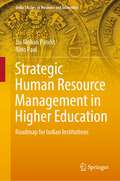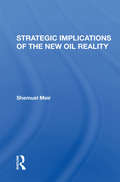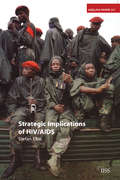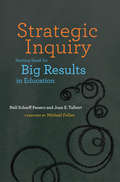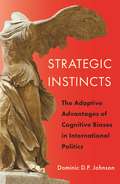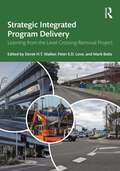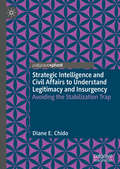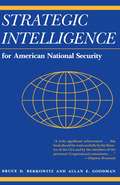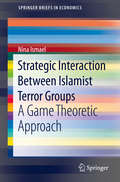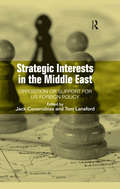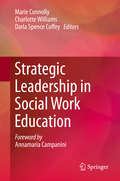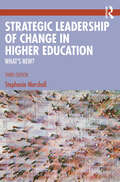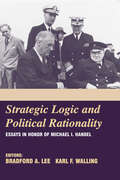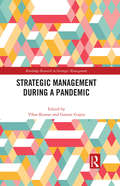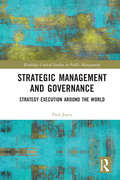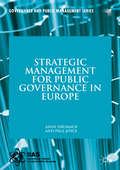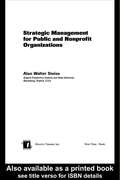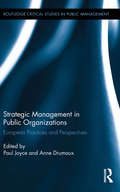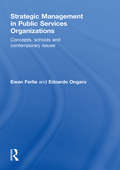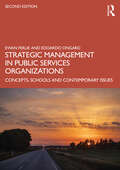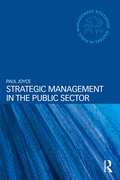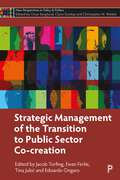- Table View
- List View
Strategic Human Resource Management in Higher Education: Roadmap for Indian Institutions (India Studies in Business and Economics)
by Jai Mohan Pandit Bino PaulThis book explores the practices and policies of human resource management (HRM) in higher education institutions (HEI), while also analyzing the governance and structural challenges. It explains the assessment of university as an organization, outlining the distinction between universities and firms from an HRM point of view by analysing various objectives, parameters and outcomes. The book broadly probes the relevance of HRM systems in HEIs in India and their potential impact. It also examines whether existing HRM practices and policies in HEIs in India drive motivation and enable employees to perform their functions to achieve the highest possible levels of excellence. It explores whether the enhanced motivation of employees consistently impacts students, their placements, progress to higher education, and quality teaching and research output. To strengthen the research output, to better understand the functioning of HRM practices in foreign HEIs and for comparative reasons, the book also studies HEIs in the United States against a diverse set of HEIs in India. It concludes by highlighting the impact of India’s National Education Policy 2020 and its scope to transform and professionalise the higher education system in the country. The book is indispensable for researchers in education management and policy studies and those in governing positions in higher education institutions. It is also a valuable resource for regulatory and government bodies, and policy-formulating think tanks in South Asia which have a similar education system as India.
Strategic Implications Of The New Oil Reality
by Shemuel MeirOriginally published in 1986. The oil crises of the 1970s and the shockwaves they sent throughout the industrialized countries and the Third World, appeared at one point to be ushering in an "Arab Century." But the first half of the 1980s produced a radically different oil reality. The price of oil dropped from over $34 per barrel in l980 to under
Strategic Implications of HIV/AIDS (Adelphi series #Vol. 357)
by Stefan ElbeProvides an overview of the evolution of political Islam in South-east Asia. Analyses the sources of relgious radicalism and assesses the regional terrorist and radical networks. Describes how secular democratic institutions can be strengthened, and how moderate and tolerant tendencies can be promoted.
Strategic Inquiry: Starting Small for Big Results in Education
by Nell Scharff Panero Michael Fullman Joan E TalbertStrategic Inquiry is an innovative model for promoting teacher collaboration around identifying specific "learning gaps" that keep struggling students from succeeding. Gaps may include anything from the proper use of commas and conjunctions to concepts such as "slope" in math. The authors argue that addressing these critical learning gaps can lead to big changes in student success, in teachers' sense of efficacy, and in school culture. The strategic inquiry model has been implemented in schools and districts around the country, including New York City, where it was rigorously evaluated with impressive results. As Common Core standards raise the bar for student learning ever higher, this proven approach promises to build teachers' capacity for closing the gap between where struggling students are and where they need to be."
Strategic Inquiry: Starting Small for Big Results in Education
by Nell Scharff Panero Joan E TalbertStrategic Inquiry is an innovative model for promoting teacher collaboration around identifying specific &“learning gaps&” that keep struggling students from succeeding. Gaps may include anything from the proper use of commas and conjunctions to concepts such as &“slope&” in math. The authors argue that addressing these critical learning gaps can lead to big changes in student success, in teachers&’ sense of efficacy, and in school culture. The strategic inquiry model has been implemented in schools and districts around the country, including New York City, where it was rigorously evaluated with impressive results. As Common Core standards raise the bar for student learning ever higher, this proven approach promises to build teachers&’ capacity for closing the gap between where struggling students are and where they need to be."
Strategic Instincts: The Adaptive Advantages of Cognitive Biases in International Politics (Princeton Studies in International History and Politics #172)
by Dominic D. Johnson"A very timely book."—Anne-Marie Slaughter, CEO of New AmericaHow cognitive biases can guide good decision making in politics and international relationsA widespread assumption in political science and international relations is that cognitive biases—quirks of the brain we all share as human beings—are detrimental and responsible for policy failures, disasters, and wars. In Strategic Instincts, Dominic Johnson challenges this assumption, explaining that these nonrational behaviors can actually support favorable results in international politics and contribute to political and strategic success. By studying past examples, he considers the ways that cognitive biases act as “strategic instincts,” lending a competitive edge in policy decisions, especially under conditions of unpredictability and imperfect information.Drawing from evolutionary theory and behavioral sciences, Johnson looks at three influential cognitive biases—overconfidence, the fundamental attribution error, and in-group/out-group bias. He then examines the advantageous as well as the detrimental effects of these biases through historical case studies of the American Revolution, the Munich Crisis, and the Pacific campaign in World War II. He acknowledges the dark side of biases—when confidence becomes hubris, when attribution errors become paranoia, and when group bias becomes prejudice. Ultimately, Johnson makes a case for a more nuanced understanding of the causes and consequences of cognitive biases and argues that in the complex world of international relations, strategic instincts can, in the right context, guide better performance.Strategic Instincts shows how an evolutionary perspective can offer the crucial next step in bringing psychological insights to bear on foundational questions in international politics.
Strategic Integrated Program Delivery: Learning from the Level Crossing Removal Project
by Mark Betts Walker, Derek H.T. Love, Peter E.D.This book outlines a cutting-edge form of program delivery which the authors term SIP-Form or Strategic Integrated Program delivery. Using the Melbourne Level Crossing Removal Program (LXRP), consisting of the removal of 85 dangerous level crossings throughout metropolitan Melbourne, including rail station upgrades, signalling and track work, and other associated capital works, as an exemplar, the book sets out four features that the authors argue define the SIP-form concept as follows: The organisation delivers a program of projects, many using an IPD contract variant form such as a Project Alliance Agreement (PAA) in Australia and numerous other countries, or the Integrated Form of Agreement (IFoA) in North America The contract form adopted is used and has been strategically designed to accommodate the project’s risk and uncertainty profile, as is the case with the LXRP Projects within the program are integrated with some being concurrently delivered with coordination across the projects in a coherent and highly purposeful manner. Projects are not included that do not strategically fit the overall program delivery strategy There is a strategy for learning and innovation diffusion across projects, concurrently and sequentially. Lessons to be learned are learned through designed-in governance mechanisms The LXRP is a potentially unique program of projects, and the book takes the reader on a journey through this complex program and after giving the background and relevant context covers topics such as strategy, governance, procurement, collaboration, program alliance, HRM, leadership, digital innovation, continuous improvement, community engagement, and performance measurement. This detailed analysis of such a complex program of projects makes this book essential reading for project managers, engineers, and advanced students of project delivery and management.
Strategic Intelligence and Civil Affairs to Understand Legitimacy and Insurgency: Avoiding the Stabilization Trap
by Diane E. ChidoThis book describes the common pitfalls of U.S. military interventions in efforts at stabilization, which supports post-conflict societies by establishing stable governance, rule of law, a safe and secure environment, economic development and social well-being for all members of the population. These efforts are often unsuccessful and can even cause harm when mission teams do not understand both the populations with whom they are engaging and policymakers. The book recommends prioritizing a relational approach to stabilization with a professional and well-resourced Civil Affairs and strategic intelligence approach to engagements over the current preference for transactional, often lethal operations.
Strategic Intelligence for American National Security: Updated Edition
by Bruce D. Berkowitz Allan E. GoodmanBruce Berkowitz and Allan Goodman draw on historical analysis, interviews, and their own professional experience in the intelligence community to provide an evaluation of U.S. strategic intelligence.
Strategic Interaction Between Islamist Terror Groups: A Game Theoretic Approach (SpringerBriefs in Economics)
by Nina IsmaelThis book applies game theory to the phenomenon of terrorism and investigates how the competition for support can influence the attack behavior of terror organizations. In addition, it examines the economics of terrorism. The so-called outbidding theory, which has become increasingly popular within the field of terrorism research, argues that terror groups vying for resources will engage in more and more violence to demonstrate their capabilities and commitment to their cause. This book challenges the outbidding concept by providing a game-theoretical analysis, which shows that a contest between two terror groups can be interpreted as a race for support. This interpretation may help explain why major attacks occur at all: not as a result of outbidding, but as a result of losing the race. In addition, the author shows that rivalry between terror groups does not necessarily lead to more attacks, but can result in less terrorism due to an increased probability of attack failure induced by the race. Lastly, the model is applied to the rivalry between al-Qaeda and Daesh, elaborated on with empirical evidence. Given its scope, the book is a must read for researches and scholars working in the fields of economics, politics, the social sciences, and military history, as well as military and political decision-makers and authorities working in the field of risk management.
Strategic Interactions between an Independent Central Bank and a Myopic Government with Government Debt
by Sven Jari Stehn David VinesA report from the International Monetary Fund.
Strategic Interests in the Middle East: Opposition or Support for US Foreign Policy
by Jack CovarrubiasAs a cultural centre for Islamic interests across the world and as a focus point for increasing levels of economic and security interdependence, the Middle East remains a stage on which international politics will be played for the foreseeable future. This comprehensive study looks at the important international and regional actors and their interaction with, and reaction to, US foreign policy toward the region. The volume elucidates the trends in great power interest and interaction in the Middle East and studies the impact of the United States as the region's foremost military power. It highlights the changing nature of actors' relationships with the US and each other as their interests and policies evolve in response to changes in the region. Scholars, graduate and undergraduate students and the interested public will find this volume a useful guide and an ideal companion work for courses on the Middle East, US foreign policy and international security issues.
Strategic Leadership in Social Work Education
by Marie Connolly Charlotte Williams Darla Spence CoffeySocial work leaders constantly strive to incorporate cutting-edge research and promote international collaboration in a dynamic contemporary environment. To address these ongoing concerns, this unique book focuses specifically on strategic leadership, asking critical questions about change-making, political strategy, and the opportunities that present themselves to lead new directions in social work education. Among the topics covered: Disruptive agendas and research dialogues in social work education Diversity leadership and perspectives beyond the mainstream The role of international bodies in advancing social work education Intellectual leadership and anticipating future advances in teaching strategies Democratising social work education Collaborative leadership models Strategic Leadership in Social Work Education examines the ability of social work to shape futures through education, training, and effective leadership, and suggests strategies for advancing responsible social work education in order to best meet tomorrow’s needs and aspirations.
Strategic Leadership of Change in Higher Education: What's New?
by Stephanie MarshallThe fully updated third edition of Strategic Leadership of Change in Higher Education provides a clear overview of the basic principles of effective leadership and management of change, and assists strategic leaders to better contextualise – both globally and more locally – the external environment in which they are operating.It provides case studies and stories from exemplary globally strategic leaders who have led their universities through the complexities of the pandemic, have come out the other side stronger and more resilient, and who continue to adapt. This third edition has been updated with consideration of the significant changes in global factors, including the pandemic; it: Reflects on the ways in which the pandemic was a watershed moment for higher education institutions Reassesses the environment in which universities operate today, facing demanding higher education policy and regulation, tough financial circumstances and unabating technological developments Re-examines the insights and initiatives from the second edition, asking how changes in our collective conscience and knowledge are reflected in our ways of working and execution of change Includes a concluding ‘Looking Forward' section, integrating and distilling the diverse approaches of successful leaders, offering narratives on how to navigate the rapidly changing landscape with reflective action This key title is crucial reading for all those involved in leadership and management positions in higher education. With an emphasis on principles of strategic and contextual thinking and problem-solving, alongside a strong commitment to shared values as key ingredients to the success of strategic leaders, this book provides expert commentary and global insights. This cutting-edge text will continue to provide higher education leaders and managers with insights against which to benchmark their approaches, supporting them to stay ahead of the curve.This book is dedicated to all those value-led higher educational strategic leaders around the globe, who continue to inspire full engagement in transforming universities for the ultimate betterment of society.
Strategic Logic and Political Rationality: Essays in Honor of Michael I. Handel
by Bradford A. Lee Karl F. WallingOne of three volumes in honour of the teaching and scholarship of the late Michael I. Handel, this book details the universal logic of strategy and the ability of liberal-democratic governments to address this logic rationally.Treating war as an extension of politics, the diverse contributors (drawn from the United States, the United Kingdom, Australia and Israel) explore the difficulties in matching strategy to policy, especially in free societies.
Strategic Management During a Pandemic (Routledge Research in Strategic Management)
by Vikas KumarThe COVID-19 pandemic changed world dynamics, working scenarios, as well as professional and emotional dimensions. The virus has emerged as a significant threat for the continuity of business. Keeping the gravity of the problem in mind, companies must understand the need for change and must now update their strategy to account for pandemics. The next pandemic may be more severe than the current one, meaning that organizations need to devise mechanisms and business models to fight with these situations and maintain business continuity. They should not only look forward to saving plants, machinery and infrastructure, but also concentrate on employee welfare, customer engagement and satisfaction during this crisis time. The book will not only present the evidence of various effective solutions to run a business in the time of a pandemic, but also put forward the new models and practices of business being followed by people at the time of crisis. It aims to create a bridge between existing business models and proposed business solutions, focusing on existing theories and most importantly case studies from recent happenings. This rich collection of chapters will provide insights regarding the business challenges, opportunities and practices during pandemic situations like COVID-19, making it particularly valuable to researchers, academics and students in the fields of strategic management, leadership and disaster management.
Strategic Management and Governance: Strategy Execution Around the World (Routledge Critical Studies in Public Management)
by Paul JoyceThis book is an investigation into the evolving nature and consequences of strategic management in public governance. It is prompted by the practical as well as the academic interest in the application of strategic management to public governance and to the public sector. The main features of this book are its management focus, its use of published statistics and expert ratings to develop empirical insights into the capabilities and processes of strategic management in government, and its concern for practical relevance. Although this book deals with governments, it is a management book and not a political book. It is, in fact, a management book that "frames" strategic management in government as a tool of (or enabler of) the public governance process. This is relatively novel. The book’s management focus has several themes, which can be summed up as comprising: the use by government of long-term strategic visions and strategies, effective management of the delivery of strategic visions and strategies, the performance of national governments, and the implications of strategic state capabilities for the quality of public services, for sustainability, and for managing strategic crises. This book will be relevant reading to researchers, scholars, advanced students, policy makers and public administrators in the fields of strategy, strategic management, and public governance.
Strategic Management and Public Service Performance
by Richard M. Walker George A. Boyne Rhys Andrews Jennifer LawStrategic management makes a difference to the performance of public organizations. This book demonstrates that the most appropriate response is 'it all depends': on which aspects of strategy content and processes are pursued together, and how these are combined with organizational structure and the technical and institutional environment
Strategic Management for Public Governance in Europe
by Paul Joyce Anne DrumauxThis book investigates the role and effectiveness of strategic management within public governance in Europe. Using findings from qualitative studies, it explores the governance processes at the level of the European Union as a supranational institution, and the level of national governments. It presents empirical research that reveals fresh insights into the extent to which the public, effective government, and desirable societies are interrelated in individual Member States. Further, it enables the authors to critically analyse and develop the concept of the 'Strategic State', and to introduce the idea of 'credible government' that lays out a pathway to effective governance. This book argues for the need to develop more effective multi-level governance that combines unity of strategic purpose at the European level with strategic leadership and mobilisation at the national level. It will appeal to practitioners in addition to scholars in the fields of public policy, public management and European Union studies.
Strategic Management for Public and Nonprofit Organizations (Public Administration and Public Policy)
by RoutledgeThe central resource for process improvement and innovation, this book includes valuable techniques to identify and improve organizational processes, as well as manage the change that accompanies implementation. Strategic Management for Public and Nonprofit Organizations discusses SWOT analysis, TQM, systematic innovation, Six Sigma, quality function deployment, process mapping, gap analysis, and activity based costing. With helpful references to secondary sources and a comprehensive glossary, this text will benefit public administrators, financial managers, public planners, investment managers, policy analysts, and public policy specialists, and upper-level undergraduate and graduate students in these disciplines.
Strategic Management in Public Organizations: European Practices and Perspectives (Routledge Critical Studies in Public Management #20)
by Paul Joyce Anne DrumauxStrategic Management in Public Organizations: European Practices and Perspectives offers the first wide-ranging survey and assessment of strategic management practices at various levels of government and public service in European countries. It shows that strategic management is much more than a management tool imported from the private sector - it has become a key element of public management reforms, and European governments at all levels are developing ‘strategic state’ characteristics. Written by leading European experts on strategic management in the public sector and in government, this book presents evaluations and analysis based on empirical investigations. The book covers strategic management at different levels of government, explore the roles of different players, and incorporate theory and practice, with opening and concluding chapters by the editors that provide an overview of strategic management in the public services and a cross-societal discussion of practices, reforms, and lessons. It reflects not only developments in strategic management practices in the European public sector, but also the increasing importance of strategic capabilities for the modernization of public governance. This book is ideal for students in postgraduate management courses (MPA, MSc, or MBA) in Europe and elsewhere.
Strategic Management in Public Services Organizations: Concepts, Schools and Contemporary Issues
by Ewan Ferlie Edoardo OngaroStrategic Management in Public Services Organizations sets out to connect the two traditionally disparate academic literatures of public management and strategic management. The authors argue that some models of strategic management are now of enhanced relevance for contemporary public services organizations, especially when considering successive New Public Management reforms. This observation has important consequences for the requisite work practices, skills and knowledge bases of current public managers, as they are increasingly being asked to act as strategic as well as operational managers. Strategic Management in Public Services Organizations takes a strongly comparative and international perspective in addressing the fundamental issue of strategic management within diverse public administrative traditions. The impact of strategic management on the performance of public agencies is examined and it is argued that the appropriate use of strategic management models depends on the politico-administrative and cultural contexts of the public services organization in question, concluding that there is no single best way to strategically lead public organisations. This is an advanced textbook aimed at the postgraduate level, particularly students on MPAs and MBAs with a public sector option or MScs in Public Policy and Public Management.
Strategic Management in Public Services Organizations: Concepts, Schools and Contemporary Issues
by Ewan Ferlie Edoardo OngaroStrategic Management in Public Services Organizations takes a comparative and international view on the appropriate use of strategic management models that are affecting the way public services organizations are managed. In an era of New and post New Public Management reforms, public managers at all levels are expected to respond to these new approaches, which profoundly affect their work practices, skills, and knowledge bases. Choosing a promising strategic management model and implementing it in a way that works for the organization or inter-organizational network in question also depends on an understanding of local politico-administrative and cultural contexts: this book helps the readers identify how to successfully tailor strategic management approaches to their specific circumstances and needs. This second edition builds upon the successes of the well-received first edition. Thoroughly updated to help public managers meet the challenges of a new decade, it has a refreshed collection of mini-cases and now includes chapter summaries. It also includes a new chapter on collaborative strategy and co-creation, in response to the growth of interest in more open forms of public policymaking. This is an advanced textbook aimed at the postgraduate level, particularly students on MPAs and MBAs with a public sector option or MScs in public policy and public management.
Strategic Management in the Public Sector (Masters in Public Management)
by Paul JoyceStrategic management is widely seen as essential to the public services, leading to better performance and better outcomes for the public. In fact, the private sector idea of strategic management has become so powerful in the public sector that politicians and policy makers have begun to talk about the importance of the modern state being strategic – and we may be witnessing the emergence of the Strategic State. Strategic Management for the Public Sector draws on experience and research from a range of countries and provides a theoretical understanding of strategic management that is grounded in the public sector. Drawing on the latest theory and research this text provides a fresh look at foresight, analysis, strategic choice, implementation and evaluation. This book also offers original and detailed case studies based on up to date evidence from different public sector settings, helping the reader to build on their understanding of theories and concepts presented earlier in the book. Strategic Management for the Public Sector has been written specially for managers and students taking postgraduate courses such as MBAs and MPAs. It will also appeal to individual managers and civil servants in the public sector looking for an accessible book to read as part of their own independent personal development.
Strategic Management of the Transition to Public Sector Co-Creation
by Jacob Torfing, Ewan Ferlie, Tina Jukić and Edoardo OngaroAs the practices of public governance are rapidly changing, so must the theoretical frameworks for understanding the creation of efficient, effective and democratic governance solutions. First published as a special issue of Policy & Politics journal, this book explores the role of strategic management, digitalisation and generative platforms in encouraging the co-creation of innovative public value outcomes. It considers why we must transform the public sector to drive co-creation and the importance of integrating different theoretical strands when studying processes, barriers and outcomes. This book lays out important stepping-stones for the development of new research into the ongoing transition to co-creation as a mode of governance.
